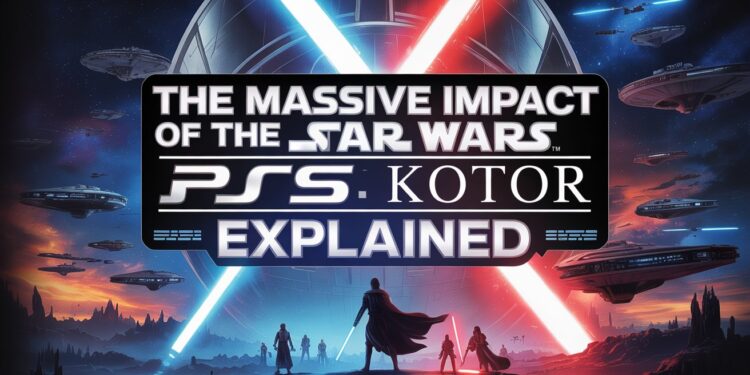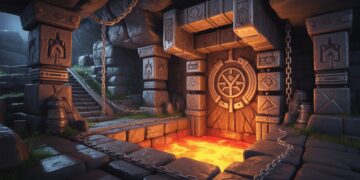When the Star Wars: Knights of the Old Republic remake was first announced, the gaming world immediately erupted with excitement, speculation, nostalgia, and even a bit of fear. And while countless games are remastered or reimagined every year, few reach the level of cultural weight and emotional investment that the KOTOR remake commands. In fact, when people discuss three reasons the PS5 Star Wars: KOTOR remake is such a huge deal, they usually land on a combination of factors involving the legacy of the original game, the platform exclusivity strategy, and the unusual, drama-filled development journey that has turned the remake into one of the most talked-about gaming projects of the decade. The excitement doesn’t come from a single source—it’s the product of twenty years of history, shifting console politics, passionate fan expectations, and a remake that has existed in a cloud of both hope and uncertainty.
The Legacy of the Original KOTOR
The first and perhaps most universal reason the PS5 KOTOR remake is such a monumental event is simple: the original 2003 KOTOR is one of the most beloved and influential RPGs ever made. Even today, KOTOR tops ranking lists, serves as required playing for RPG enthusiasts, and stands as one of the most critically respected Star Wars stories ever crafted. Unlike many licensed titles, it wasn’t just a “good Star Wars game”—it was a groundbreaking game that helped define what narrative-driven RPGs could be.
Part of its prestige comes from the depth of its storytelling. KOTOR wasn’t afraid to give players a morally complex narrative set thousands of years before the films. With that distance from the Skywalker saga, the developers were free to explore new characters, new Force philosophies, and entirely new conflicts. The famous twist revealing the player character’s identity as Revan is still considered one of the best narrative reveals in gaming history because it subverted expectations, played into themes of identity and morality, and rewarded the player for paying attention.
Equally important was how KOTOR elevated player choice. Every decision—big or small—played into a morality system that shaped the ending, your abilities, and how characters viewed you. This kind of branching storytelling influenced everything from Mass Effect to The Witcher 3, and modern RPG studios still cite KOTOR’s structure as foundational. For longtime fans, the idea of seeing this legendary game rebuilt for the PS5 with modern graphics and technology is almost emotional. For new players, the remake represents the chance to experience a story that has shaped two decades of RPG design. In short, the legacy alone creates the first major reason why the remake is such a big deal.
Why the PS5 Platform Makes the Remake Even Bigger
The second major factor in three reasons the PS5 Star Wars: KOTOR remake is such a huge deal is the PlayStation angle. When the remake was announced as a PS5 timed console exclusive, it shocked the entire industry because the original KOTOR is closely associated with Xbox. Back in 2003, the game launched exclusively on the original Xbox and PC, and many gamers still think of the franchise as part of Xbox’s classic era. With the remake shifting to PS5, it symbolized a major shift in the balance of power between Sony and Microsoft, especially in the genre of big, narrative-heavy Western RPGs.
Sony has been building a portfolio of cinematic single-player hits for years—Demon’s Souls, God of War, Ghost of Tsushima, and Horizon Forbidden West are just a few examples. Adding a high-profile Star Wars remake to the PS5 library strengthens that strategy and helps attract players who traditionally leaned toward PC or Xbox for RPG experiences. The exclusivity also enhances the “event status” of the remake. When a game this important becomes tied to a specific platform, it automatically becomes a conversation piece in the larger console ecosystem.
Beyond the platform politics, the PS5’s hardware potential adds another layer of anticipation. Fans expect the remake to deliver modern graphics, detailed character models, next-gen lighting effects, faster load times, expanded environments, redesigned combat, and full cinematic presentation. Although the original KOTOR was revolutionary for its time, modern audiences expect far more fidelity in gameplay and visual storytelling. A PS5-powered remake offers the opportunity to revisit iconic moments—the Revan reveal, the Star Forge, and interactions with characters like Bastila Shan and HK-47—in a way that matches the emotional impact players felt in 2003.
Furthermore, the partnership with PlayStation contributes to the broader future of Star Wars in gaming. If the PS5 remake is successful, it could inspire more Old Republic-era titles, new expansions, or even encourage Lucasfilm to bring more of that lore into the official canon. The remake is not happening in a vacuum; it exists in a moment where Disney is reshaping Star Wars storytelling across all media. A successful PS5-exclusive remake could influence which stories Lucasfilm chooses to highlight in the coming years.
Development Drama Turned the Remake Into a Cultural Phenomenon
The third reason behind the enormous buzz surrounding the KOTOR remake is the most unexpected: its chaotic development history. Usually, development setbacks kill hype—but in this rare case, they amplified it. Fans found themselves not just waiting for a game, but following a dramatic, unpredictable saga filled with studio shifts, delays, leaks, and corporate shake-ups. It’s the kind of industry story people become obsessed with because it combines mystery, hope, nostalgia, and the fear that an incredible opportunity might be lost forever.
After the stunning announcement trailer, reports surfaced that development had stalled. The remake was originally being led by Aspyr, a studio known for porting Star Wars titles, but a series of internal issues reportedly caused the project to be put on pause. Leadership changes occurred, the vertical slice failed to meet expectations, and eventually development was moved from Aspyr to Saber Interactive. That transition alone fueled months of debate. Would Saber stick closely to Aspyr’s vision? Would they start from scratch? Was the project still alive?
Then came the radio silence. Sony delisted the reveal trailer. Rumors circulated that the game was canceled. Leaks surfaced showing early footage and concept art that only deepened the community’s curiosity. What should have been a straightforward remake suddenly became the gaming industry’s most-watched mystery. Forums, YouTube channels, Reddit threads, and news sites dissected every tiny update, from investor statements to job listings.
Strangely, this uncertainty made the remake more famous than ever. The follower count on social channels grew. Articles continued to trend. Fans who hadn’t thought about KOTOR in years rediscovered the original. Instead of letting the project fade, the drama transformed it into a modern gaming legend—a long-sought treasure that players fear may vanish but desperately hope to one day experience. In the world of gaming culture, few things capture attention like a project that exists in limbo yet refuses to die.
What Players Expect From a Modern KOTOR Remake
With the legacy, platform strategy, and development story creating massive anticipation, fan expectations have reached an all-time high. Many believe the remake could redefine what a next-gen RPG looks like. Players expect the combat system to be rebuilt into something more fluid and action-oriented while staying true to the tactical roots of the original. Others hope to see expanded dialogue options, deeper character arcs, improved companion interactions, and visual environments that match the grandeur of the Star Wars universe.
Another major question surrounds how closely the remake will follow the original story. Most players want the core narrative preserved, but there is also openness to expanded lore, canon-friendly adjustments, or refined storytelling that adds emotional depth. The Old Republic era has enormous narrative potential, and a faithful yet creatively enhanced remake could become the definitive version of the story for new generations.
How the Remake Could Redefine Star Wars Games on PS5
If executed well, the KOTOR remake could become a milestone not just for the PS5, but for Star Wars gaming as a whole. It could prove that the Old Republic era—which remains beloved but underused—deserves a bigger presence in modern Star Wars storytelling. It could also show that PlayStation is a viable home for large-scale Western RPGs, giving Sony a foothold in a territory where Xbox and PC previously dominated.
Perhaps most importantly, it could set a new standard for how to remake a classic. The stakes are higher than usual because the original KOTOR isn’t merely a good game—it’s a foundation of RPG history. Rebuilding it for PS5 means honoring that legacy, elevating it, and ensuring it resonates with players who aren’t bound by nostalgia.
Conclusion
When exploring the three reasons the PS5 Star Wars: KOTOR remake is such a huge deal, the answer becomes clear. First, the original KOTOR stands as a legendary RPG whose story and characters still resonate. Second, the PS5-exclusive approach elevates the remake into a platform-defining showcase and a symbolic moment in console gaming. And third, the development saga—filled with delays, studio changes, and speculation—turned the remake into one of the most closely followed projects in gaming history.
Whether the final product releases soon or remains a mystery a bit longer, its impact is already undeniable. The KOTOR remake has become more than a game: it’s a phenomenon grounded in legacy, platform power, and the passionate hope of millions of fans waiting to see a legend reborn.
Do Read: Lync Conf Gaming: Explore Mods, Multiplayer Innovation, and Gamified Experiences


















